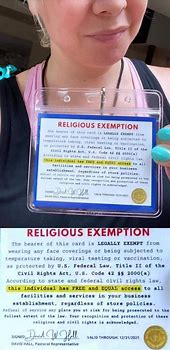Below is a review of the posts (on Facebook, LinkedIn, and Twitter) from the past week. You can check out the full posts by clicking on the links.

In the post on Sunday 12/5/2021 we learned about the 5 things equal opportunity employers should know. In this era of DEI, it is imperative that employers know how to be inclusive in the workplace. They need to know (1) what is equal employment opportunity, (2) what is an equal opportunity employer, (3) the benefits of being an equal opportunity employer, (4) the importance of being an equal opportunity employer, and (5) what makes a good EEO policy. Let’s go through those items individually. First, equal employment opportunity (EEO) is when everyone has an equal chance at employment based on merit; it also includes fair and equal treatment in the workplace. The forgoing is, of course, tempered by the intersection of EEO law with other laws as noted in the post. Next, an equal opportunity employer is one that commits to not discriminating against applicants or employees based on race, color, religion, sex, national original, age, disability, or genetic information. Again, there are a few exceptions (as noted in the post) and good reasons for an employer to present equal opportunities (also as noted in the post). The benefits and importance of being an equal opportunity employer, as well as what makes a good EEO policy, are all discussed in the post.
TAKEAWAY: Employers must know not only what to say relative to the law (i.e., non-discrimination based on factors other than merit), but how to implement what they say. Consult an employment lawyer to help.

The post on Monday 12/6/2021 told us a medical center will pay $450,000 to settle EEOC disability discrimination lawsuit. Yep, big bucks for big legal mistake. The EEOC alleged that Willis-Knighton Medical Center required employees who exceeded a fixed leave-and-light-duty cap to be fully fit for duty and fired those who exceeded the cap. And why was that a(n alleged) legal violation? See the post – and understand what it is telling you about your obligations as an employer under the ADA. The settlement includes both the monetary payment and a 3-year consent decree by which the medical center rescinded the objectionable policy and the many other things noted in the post. Those things that are part of the settlement are also a guidepost for employers as to what they should be doing from the start.
TAKEAWAY: Know your obligations under the ADA and every other applicable law. Get legal assistance if you are unsure.

The post on Tuesday 12/7/2021 noted that a condo COVID lawsuit continues with the Condo Association still a Defendant. The suit claims that the Association and its management company illegally sued to order owners to remain inside their unit while battling COVID. Got that? Let’s look at the background. Steve and Nancy Iscowitz tested positive for COVID-19 in July 2020. They told the Association which then told them to stay in their unit until they tested negative. How did they respond? See the post (although part of it won’t be a surprise). As a result, the Associaotion and its management company sued the Iscowitzes, seeking an order that they isolate in their unit. That suit ended quickly on the basis and as noted in the post. But the chapter did not end there. Then the Iscowitzes brought their suit, alleging that the first suit (by the Association and management company) should not have been brought in the first place. You ask what kind of damages they suffered as a result? See the post. And the response by the Association is also in the post. As of early November, the suit was still moving forward.
TAKEAWAY: In this scenario there were shared elevators used to access the units; would it make a difference if instead there was only a common lobby? Either way the Association has a duty to keep owners and residents safe, so knowing what must or should be done is important. A community association lawyer can help.

The post on Wednesday 12/8/2021 asked: When does a COVID-19 vaccine accommodation cause an undue hardship? The answer to this question becomes more relevant as an increasing number of employees request exemption from vaccination for medical or religious reasons. Once the medical or religious basis is proven by the employee, it is your job as the employer to see if an accommodation can be provided or if it would be an undue hardship to provide an accommodation. The ADA governs the accommodation process for medical requests and Title VII for religious requests. They are NOT the same. For medical (including disability and pregnancy-related) accommodations, the parties must engage in the interactive accommodation process and try to find something that will enable the employee to perform the essential functions of the job (with or without accommodation). Examples of possible accommodations for those who cannot get vaccinated are noted in the post. But what if all such accommodations would be an undue hardship? Employers should consider many factors when deciding if an accommodation would be an undue hardship under the ADA; those factors are listed in the post. The answers will vary for each and every request based on the individual facts. And what about a request for exemption from COVID vaccination on religious grounds? That is governed by Title VII. There is no undue hardship standard/analysis; rather, it is a much easier burden for employers as noted in the post. But the interactive process should still be followed as noted in the post.
TAKEAWAY: Requests for accommodation in the fact of COVID vaccination will continue to increase; employers need to know how to proceed depending on the basis for the request and applicable law. Getting an employment lawyer involved early will help protect your business.

In the post on Thursday 12/9/2021 we read that employers should plan for vaccine-or-testing rule while litigation ensues. Unless you’ve had your head in the sand, you know of the President’s vaccine-or-test policy for employers of at least 100 employees and OSHA’s recent emergency rule. And you also know that the policy has been put on hold by a federal court, at least temporarily. But in case the temporary freeze is lifted, or the litigation resolved by upholding the policy, employers should be ready for its implementation. OSHA published an emergency temporary standard (linked in the post) that requires applicable businesses to ensure vaccination or mask wearing and testing at least weekly. So, what are the things employers should be ready to implement, the deadlines, and to whom it applies (and the exceptions)? See the post. Hint: one piece is that employers are required to have a written policy for implementation!
TAKEAWAY: Both the President’s policy and OSHA’s ETS may be found valid, such that employers need to know their obligations. The good news is that there will not be an overlap in reach or record-keeping requirements (as noted in the post).

The post on Friday 12/10/2021 told us an HOA decides to grandfather in renters after 180 families faced possible eviction. Wow – would your Association go that far? This happened in Raleigh, NC, but could be anywhere, even your community. A month or so ago the Association’s Board said it would enforce its no-rental policy, thus requiring up to 180 families to move. (Query: does anyone see a problem with the fact that this was not addressed until there were 180 rental units instead of much much earlier on?) the community has about 1000 units; of those, about 180 are rentals. The no-rental policy was always there, but apparently never enforced. A new sheriff came to town when the new Board came in in early 2021; what is planned to do relative to rentals, and the reasonable timing, is in the post. But a recent special meeting of the board led to a change of course and some grandfathering, with exceptions, all as noted in the post.
TAKEAWAY: Lack of enforcement of any policy (or restriction) can have legal implications for owners or the association; get advice and assistance from a community association lawyer.

Finally, in the post yesterday 12/11/2021, we learned that vaccine-exemption requests are putting legal departments in a tricky spot (which will only increase). As vaccine mandates increase, so too do requests for exemption from the mandates for medical or religious reasons. Also, some employees are not requesting exemptions but just leaving their employment; others wait until an exemption request is denied and then quit. While the EEOC and DOJ say that mandates are legal, that does not assist with the feasibility of accommodation requests and shrinking workforces – which are expected to deliver the same service as pre-pandemic. The Administration’s policy affecting employers with over 100 employees, and OSHA’s ETS (both discussed in our post on 12/8/2021, will only exacerbate this issue. Employers have already been dealing with medial and religious requests for exemption but should expect a huge increase in the future – so having those written policies may be legally required but also makes good sense. Those policies might also include what is an undue hardship for the employer; again, see our post on 12/8/2021 as to the differences between undue hardship for a medical accommodation under the ADA and for a religious accommodation under Title VII.
TAKEAWAY: the issue of accommodation in the face of vaccine mandates, whether imposed by the feds or the employer, is not going away, so employers must have a policy on how to deal with accommodation requests. And consult an employment lawyer to make sure the policy is legally compliant.

 York, Pennsylvania 17403
York, Pennsylvania 17403